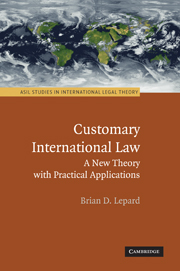Book contents
- Frontmatter
- Contents
- Figures
- Acknowledgments
- Cases
- PART ONE THE ENIGMAS OF CUSTOMARY INTERNATIONAL LAW
- PART TWO FOUNDATIONS OF A NEW THEORY OF CUSTOMARY INTERNATIONAL LAW
- PART THREE RESOLVING THE CONCEPTUAL ENIGMAS OF CUSTOMARY INTERNATIONAL LAW
- PART FOUR RESOLVING THE PRACTICAL ENIGMAS OF CUSTOMARY INTERNATIONAL LAW
- 12 General Sources of Evidence of Opinio Juris
- 13 The Role of Treaties as Evidence of Opinio Juris
- 14 The Role of United Nations General Assembly Resolutions as Evidence of Opinio Juris
- 15 The Role of Consistent State Practice
- 16 The Persistent Objector Exception
- 17 Defining Jus Cogens Customary Norms
- 18 Defining Erga Omnes Customary Norms
- 19 Resolving Conflicts with Treaties
- 20 Changing Customary International Law and the Role of International Organizations
- PART FIVE SOME APPLICATIONS OF THE THEORY
- PART SIX THE FUTURE OF CUSTOMARY INTERNATIONAL LAW
- Bibliography
- Index
17 - Defining Jus Cogens Customary Norms
Published online by Cambridge University Press: 05 June 2012
- Frontmatter
- Contents
- Figures
- Acknowledgments
- Cases
- PART ONE THE ENIGMAS OF CUSTOMARY INTERNATIONAL LAW
- PART TWO FOUNDATIONS OF A NEW THEORY OF CUSTOMARY INTERNATIONAL LAW
- PART THREE RESOLVING THE CONCEPTUAL ENIGMAS OF CUSTOMARY INTERNATIONAL LAW
- PART FOUR RESOLVING THE PRACTICAL ENIGMAS OF CUSTOMARY INTERNATIONAL LAW
- 12 General Sources of Evidence of Opinio Juris
- 13 The Role of Treaties as Evidence of Opinio Juris
- 14 The Role of United Nations General Assembly Resolutions as Evidence of Opinio Juris
- 15 The Role of Consistent State Practice
- 16 The Persistent Objector Exception
- 17 Defining Jus Cogens Customary Norms
- 18 Defining Erga Omnes Customary Norms
- 19 Resolving Conflicts with Treaties
- 20 Changing Customary International Law and the Role of International Organizations
- PART FIVE SOME APPLICATIONS OF THE THEORY
- PART SIX THE FUTURE OF CUSTOMARY INTERNATIONAL LAW
- Bibliography
- Index
Summary
A PROPOSED DEFINITION OF JUS COGENS CUSTOMARY NORMS
The definition of customary international law expounded here, combined with the theory of authoritative norms sketched in Chapter 4, help to illuminate the concept of jus cogens customary norms and their particular content. Here I focus on jus cogens norms that are customary norms. Some commentators have persuasively argued that jus cogens norms can also arise from general principles of law. This is supported by the language of Article 53 of the Vienna Convention on the Law of Treaties, which refers to peremptory norms of “general international law,” a term which, we have seen, in turn includes general principles of law. Moreover, I have elsewhere suggested that general principles of moral law that reflect essential ethical principles should be classified as jus cogens norms. The criteria used to identify jus cogens general principles of law should be similar, but not identical, to those for customary norms, which are explicated in the following pages.
I propose that customary norms of jus cogens should be defined as those norms otherwise satisfying the requirements for customary international law suggested in this and earlier chapters that:
1) states generally believe should be strongly peremptory in character because of the importance of the values they promote;
2) states generally believe further such important values that they should bind all states, even states that have persistently objected to them;
3) states generally believe in particular further such important values that they should preempt any contrary provision of an agreement between states and indeed should render such an agreement entirely void, including rendering void provisions in the agreement that do not contravene them; and
[…]
- Type
- Chapter
- Information
- Customary International LawA New Theory with Practical Applications, pp. 243 - 260Publisher: Cambridge University PressPrint publication year: 2010
- 1
- Cited by



